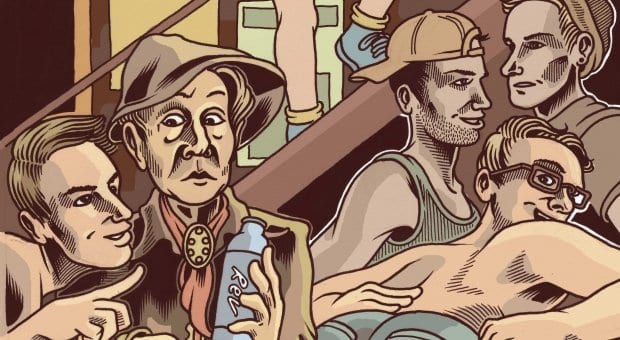Recently, while sitting in my big claw-foot tub with my laptop propped nearby (which is how I do almost everything, risking electrocution), I introduced myself to Quentin Crisp by watching The Naked Civil Servant (1975). Based on (and named after) the first volume of Crisp’s autobiography, the film covers his life up to middle age. John Hurt brilliantly portrays a gay man refusing to be anything but himself in 1930s London and survives his many beatings by adopting a supreme meekness, giving his voice “an insinuating blend of eagerness and caution in which even such words as ‘hallo’ and ‘goodbye’ seem not to be so much uttered as divulged.”
Enrapt, I began my research. Crisp was born in 1908 in Great Britain to a middle-class family. In his early 20s he was eager to reinvent himself, so he left home, changed his name to Quentin Crisp (from Denis Charles Pratt) and continued to enhance his effeminate appearance. In addition to his girlish clothing, he painted his fingernails and toenails and wore sandals so that everyone could see. He frequented gay haunts in Soho, like the Black Cat café on Old Compton Street (now the heart of London’s gay village), and worked as a rent-boy for six months. Later, he was a nude model for art classes and did this for several decades. Because he was paid by the Department of Education, he was, as he liked to say, a civil servant who was naked at work (hence, the title of his book).
Gay sex was illegal in Great Britain until 1967; Crisp could have faced the same fate as Oscar Wilde or Alan Turing, who both died (one way or another) as a result of their “gross indecency” charges. But it was crucial to Crisp that he remained one of the few visible gay men in London.
The Naked Civil Servant film made Crisp famous, and he developed a one-man stage show where he wowed audiences with his repartee. In 1981 he moved to New York City. In addition to his show, he published more books and appeared on film, including playing Queen Elizabeth I in Orlando (1992) and a pageant judge in To Wong Foo, Thanks for Everything. Julie Newmar (1995). In 2009, John Hurt once again starred as Crisp, in the film An Englishman in New York. Crisp continued to work until his death, at 90, in 1999.
Crisp visited Toronto several times and performed at Buddies in Bad Times Theatre in the late 1990s, but the most interesting artifact is a 1977 interview with Rick Bébout for The Body Politic. Crisp said lots of controversial things in his life, but Bébout’s article was most keen to learn Crisp’s views on gay liberation. In the interview, Crisp seems to hold the position that “might equals right” (that is, if he believes in rights at all) and since gays don’t have might, they can’t expect rights. According to him, people shouldn’t protest, because “all that happens is that the police get angrier and angrier at having their free time taken up by what they see as worthless.” Obviously, Bébout takes issue with this and presses Crisp on Crisp’s terms, pointing out that (at the time the article was written) people everywhere are fighting for and gaining rights. By Crisp’s own logic, if they’ve the strength to achieve the rights, don’t they deserve them? Unfortunately, Crisp had to leave the interview before conceding the point.
Crisp says contradictory things in other writings, so it’s unclear what he really thinks. In any case, I think (and Bébout would probably agree) that Crisp had good reason to be as seemingly passive as he was about rights. In his youth he was literally beaten into submission, and it was a struggle enough to remain the way he was in spite of everything. Those tactics began making less sense to society as a whole in the 1960s and ’70s, as an aggressive approach to gaining rights become more desirable — and his attitude became outdated — but I prefer to focus on the strength he showed in his youth, always reapplying his makeup after it was smudged by a punch.
(History Boys appears on Daily Xtra on the first and third Tuesday of every month. You can
also follow them on Facebook.)


 Why you can trust Xtra
Why you can trust Xtra


